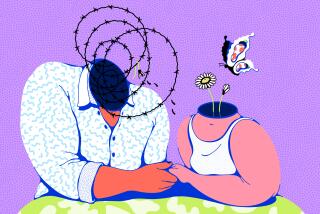Eggshell egos and the mating game
- Share via
IN CASE YOU haven’t heard, New York Times columnist Maureen Dowd has a new book out. It’s called “Are Men Necessary?” and it argues that equality between the sexes is in no better shape today than it was 30 years ago.
Actually, the book is not even out yet. The publication date is Tuesday, by which time the din of women arguing among themselves will be so loud that some of us might want to curl up with a romance novel and forget the whole business.
But we won’t, partly because the controversy is easier to follow than the White House indictments and partly because the questions raised are at once so relevant and so irresolvable that we could -- and no doubt will -- be talking about them for the next 100 years.
When I heard the title “Are Men Necessary?” what drew me in most was the “need” aspect. I hoped Dowd would say something about the conflicts that arise when women no longer have to rely on men to pay the mortgage or even to have a child. I was hoping she’d ask whether, thanks to this independence, we now perhaps don’t need men as much as we just want them.
Of course, I haven’t yet read the book, so I don’t know whether she answers these questions. But what she does clearly believe is that our lack of need causes men to not want us. In a 5,000-word excerpt in last Sunday’s New York Times, she laments the male penchant for “marrying down” -- men’s unwillingness, that is, to become romantically entangled with high-achieving women -- and cites research from economist Sylvia Ann Hewlett finding that 49% of female executives who earn $100,000 or more are childless, compared with 19% of male executives.
In the seven days since millions of women let their coffee grow cold while they devoured those 5,000 words, several times that many have been written, both in print and in impassioned e-mails, about the rightness or wrongness of Dowd’s assertion. For some, her belief that “men, apparently, learn early to protect their eggshell egos from high-achieving women” is final proof that men don’t make passes at girls who wear glasses (or, more likely these days, pay for Lasik with money earned from some formidable venture).
Others accuse Dowd of recycling the sort of angry feminist platitudes that we’ve come to see as arcane or have simply grown tired of. For every man who marries his secretary or runs off with the nanny, they argue, there’s another who wants someone who will talk about foreign policy (or foreign films or foreign adoption) while snuggling in bed.
Herein lies both the problem and the fascination in this kind of debate. Individual perspectives and experience overwhelm any possibility for consensus. For every woman who feels Dowd’s pain, there’s another who, for reasons of circumstance or temperament, thinks it’s totally backward. For every “you go, girl,” there’s an “up yours” from someone who hears Dowd’s message not as a call to arms but as the rarified experience of a woman whose Pulitzer Prize, celebrity boyfriends and Washington insiderness are hardly the stuff of the average bespectacled lass.
But there’s another factor that should be considered too, although it’s somewhat less sexy and sensationalist than the notion of men being threatened by strong women. It’s boils down to numbers.
Since the late 1980s, women have received college and graduate degrees at a higher rate than men (and the gender gap is continuing to grow). That means that the educated classes, particularly among urban dwellers in their 20s and 30s, are disproportionately female, creating the kind of shortage out of which guerrilla dating guides are born.
And while men may not always be consciously trying to marry down, the part of our biology that has not yet caught up with society might have a hand in steering them toward supporting actresses rather than leading ladies.
DOES THIS have to do with “eggshell egos”? Maybe. But the ratio imbalance suggests a larger truth, which is that even saucy political columnists who came of age before the 1980s have to reckon with today’s conventional wisdom -- and, according to the numbers, the very real truth -- that there aren’t enough “equal” men to go around.
Of course, the elephant that invariably lumbers into these kinds of debate halls is the fact that the demographic Dowd seems to be addressing -- writers, executives and smarty-pants English majors -- is no more reflective of the general American populace than she herself is. Most working-class and middle-class women are not so exacting that they will accept nothing less than James Carville/Mary Matalin-caliber power-coupling.
But among the self-conscious striving elites for whom Dowd purports to be carrying the flag, women who fail to conquer the world and align themselves with a fellow conqueror are seen as traitors to not only feminism but to themselves.
Still, I’m not sure where I come down on all of this. I’m a single woman, and I’ve certainly participated in my share of group rants about men who seem to prefer yoga teachers to strident, ambitious ego-stompers. But that’s a little too simple, just as it’s too simple to dismiss Maureen Dowd as a fussy lonely-heart who can’t land a Master of the Universe.
What I am sure of, though, is that Dowd has instigated a discussion that is already bigger, and probably more interesting, than the sum of her individual assertions.
That’s a smart move for an author, because it ultimately doesn’t matter if her book is any good. What matters is that she’s getting us talking, which means she did her job. Someone should bring her a martini and rub her feet.
More to Read
Sign up for our Book Club newsletter
Get the latest news, events and more from the Los Angeles Times Book Club, and help us get L.A. reading and talking.
You may occasionally receive promotional content from the Los Angeles Times.











